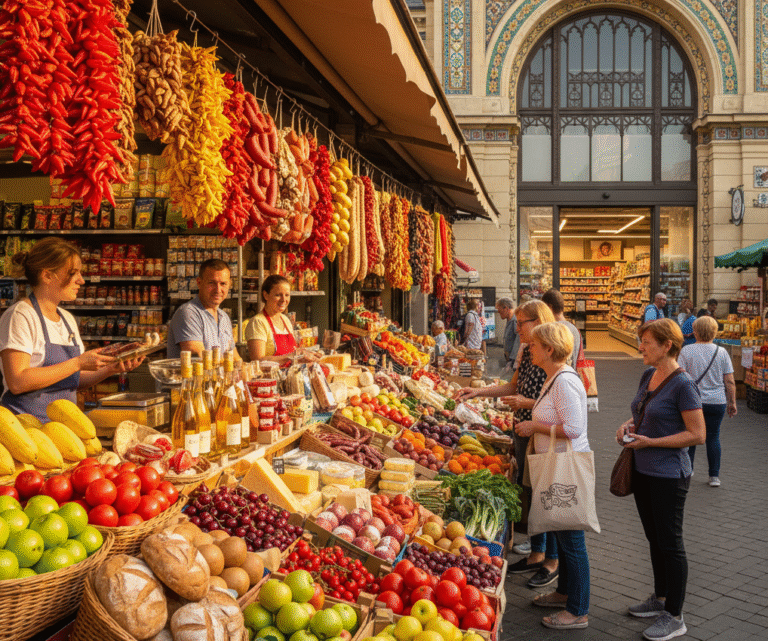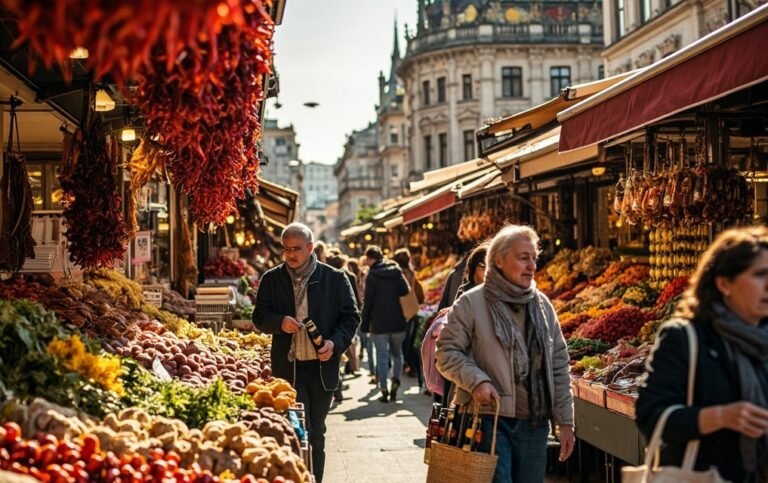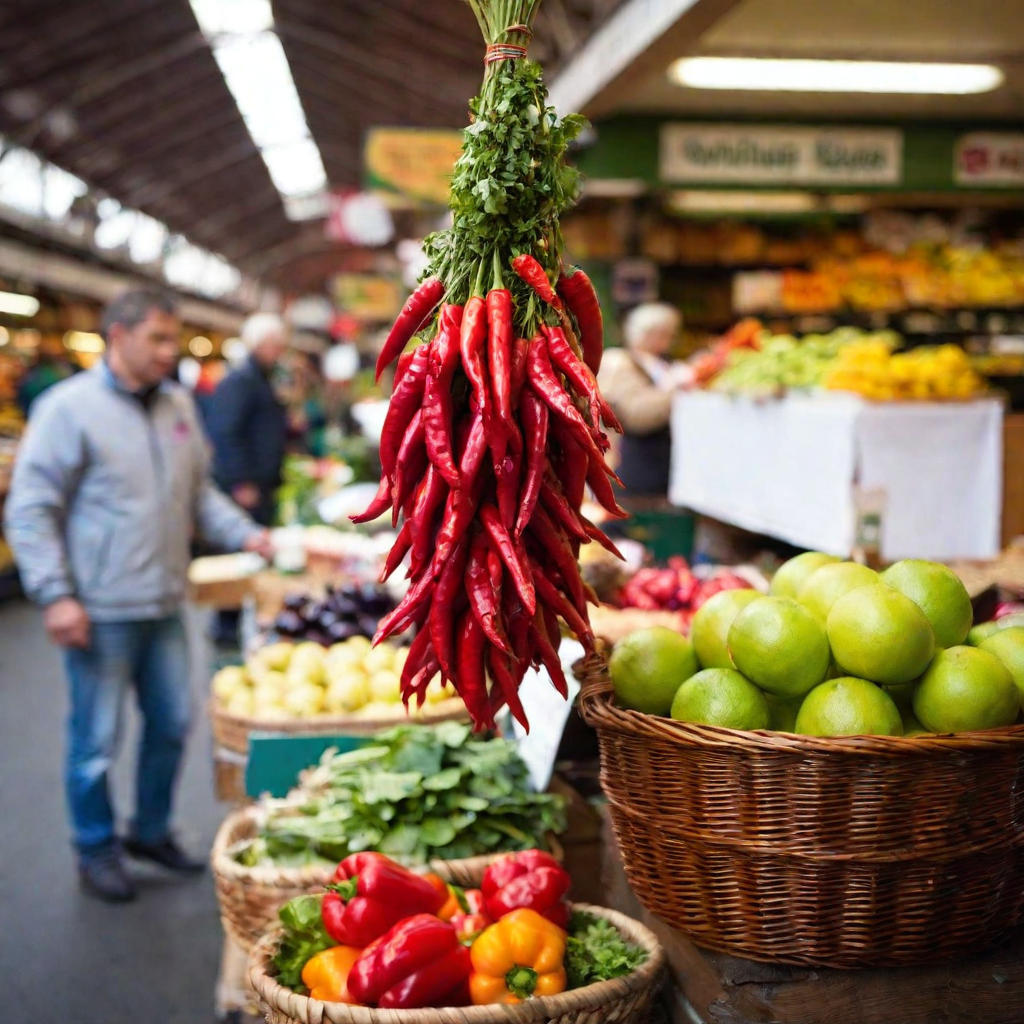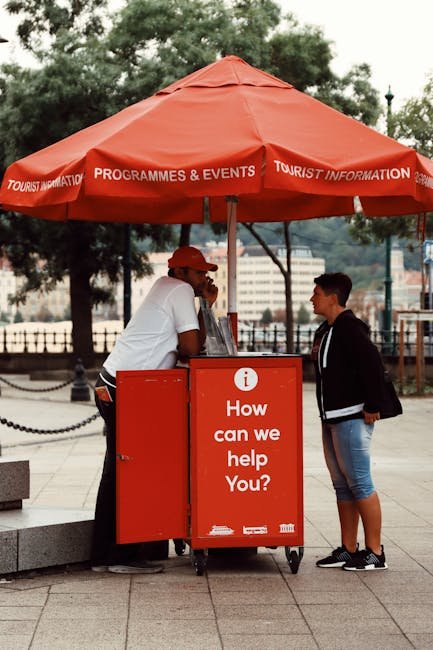Introduction: Why Grocery Shopping in Budapest is an Adventure
If you’re planning to live in or visit Budapest, one of the most practical aspects of daily life you’ll encounter is grocery shopping. While it sounds routine, in Hungary it can feel like a blend of cultural lesson, language challenge, and treasure hunt. From deciphering dairy labels to finding fresh paprika at bustling markets, grocery shopping here is both essential and fascinating.
This guide—split into two parts—covers everything you need to know about supermarkets, specialty stores, and major markets in Budapest. Part 1 focuses on supermarkets, local grocery shops, and everyday essentials, while Part 2 will dive into farmers’ markets, what to buy, iconic Hungarian ingredients, and insider tips.
The Grocery Shopping Landscape in Budapest
Budapest offers a mix of international supermarket chains, local Hungarian shops, Asian/Vietnamese minimarkets, 24/7 “ABC” stores, and traditional covered markets. Each has different strengths and quirks, so your choice depends on what you need, your budget, and how adventurous you’re feeling.
According to recent overviews on Hungarian shopping culture, most people rely on Tesco, Spar, Lidl, Aldi, Auchan, and Penny Market for bulk shopping, while locals often pop into CBA, Príma, and Reál for daily fresh foods (source).
Major Supermarket Chains in Budapest
1. Tesco, Auchan & Spar – The “Big Three”
- Tesco: The UK-origin chain offers one of the largest product ranges, including Hungarian staples and international imports. They also offer home delivery, especially useful in winter.
- Spar: Slightly pricier but with modern stores, great fresh bakery sections, and lots of city-center locations.
- Auchan: Huge hypermarkets on the city outskirts, perfect for large shopping trips if you have a car.
2. Lidl & Aldi – Budget-Friendly Champions
Many expats quickly fall in love with Aldi and Lidl. They’re budget-friendly, and while their branding is very European, their Hungarian product selection is excellent. If you’re cost-conscious but still want reliable produce, this is your go-to option.
Warning: prepare for Aldi’s infamous “speed of light checkout.” Pack fast, or face the death stares of seasoned locals.
3. Penny Market – The Middle Option
Less chaotic than Aldi, cheaper than Spar, and big in residential neighborhoods. Penny’s produce is surprisingly fresh, with strong deals on meat and dairy.
4. Local Chains (CBA, Príma, Reál)
- CBA: The classic Hungarian supermarket. Affordable, but often more limited in choice, and quality varies by store.
- Príma: The “premium” version of CBA, often in central Budapest, with imported goods at higher prices.
- Reál: Smaller franchises, good for basics, often family-owned.

The 24/7 Shops: Roni ABC & Manna ABC
When everything else is closed—like late at night, or on national holidays—ABC shops (tiny convenience stores) are lifesavers.
- Roni ABC and Manna ABC are the two largest chains.
- You’ll find alcohol, cigarettes, snacks, and basics.
- Prices are higher, but the availability is unbeatable.
Specialty & International Shops
- Asian & Vietnamese stores: Perfect for noodles, spices, and international sauces.
- BioBolt & Organic Stores: For gluten-free, vegan, or health-oriented products.
- Culinaris: The most popular imported goods shop in Budapest, beloved by expats despite the high prices. Expect British, American, and Asian products you won’t easily find elsewhere.
- Kifli.hu: Online grocery delivery with premium imported brands, including Marks & Spencer favorites.
Understanding Hungarian Dairy, Bread & Meat Sections
Dairy: The Confusing Aisles
- Tej = milk (fat % clearly marked; often unrefrigerated).
- Kefir = fermented drink, tangy and not suitable for coffee.
- Tejföl = sour cream, used as a topping for soups, stews, and the famous lángos.
- Túró = a farmer’s cheese, used in pastries, pasta, and sweet desserts.
🔑 Tip: Accidentally buying kefir instead of milk is a classic Budapest expat story.
Bread: Fresh but Fickle
Hungary loves bread—fresh loaves (friss kenyér) are everywhere. But they often go stale in just 24 hours. Locals buy fresh bread daily or freeze it for later. Kifli, crescent-shaped rolls, are a beloved breakfast snack.
Meat: Expect the Unexpected
Hungarians embrace nose-to-tail eating. In supermarkets and markets, you’ll find pig legs, organ meats, sausages (kolbász), and poultry, often with entire carcasses on display. For familiar cuts, stick to Tesco or Auchan.
Shopping Culture & Insider Tips
- Bring your own bags. Plastic bags aren’t free.
- Weigh produce at dedicated scales. In Spar and others, you must print a barcode sticker before checkout.
- Don’t expect small talk. Cashiers are efficient, but not chatty. A simple “Köszönöm” (thank you) is appreciated.
- Cash matters at local shops and markets. Cards are widely accepted at big chains, but some tiny places still prefer cash.
- Look for seasonal fruit & veg. Hungary is highly seasonal (strawberries in May, pumpkins in autumn, etc.).
Check Budapest Grocery-Costs Here
Markets, What to Buy & 2025 Prices
Continuing from above, where we explored supermarkets, local shops, and shopping habits, this part dives into Budapest’s vibrant markets, what souvenirs and foods are worth buying, and a 2025 price breakdown to help expats and travelers budget effectively.
The Great Market Hall (Nagy Vásárcsarnok)
The Great Market Hall at Fővám tér is Budapest’s most iconic indoor market – a neo-Gothic landmark built in 1897. After its meticulous post-WWII restoration, it remains the cathedral of commerce in Hungary, mixing local grocery life with tourist buzz (Hungary Unlocked).
Layout & Levels
- Ground Floor – Produce, Paprika & Salamis
Fresh fruits, vegetables, dairy, Hungarian salami (Pick, Csabai, Gyulai), and honey. This is where locals actually shop.
Tip: Skip the main aisle and head left or back rows where prices are less “tourist adjusted.” Look for Háztájtej dairy or Cserpes Sajtműhely yoghurt stands. - Basement – Pickles & Surprises
Famous for its savanyúság pickles – cucumbers, stuffed peppers, cauliflower, even pickled baby watermelon. Also home to fishmongers, butchers, and even an Asian grocery stocking noodles, sauces, and specialty veggies. - Upper Floor – Hot Food & Souvenirs
The bustling upstairs food court serves goulash, lángos, rétes (strudel), stuffed cabbage, and sausages. Be selective: only choose stalls with prices clearly displayed and fresh dishes being prepared.
Souvenirs range from embroidery, porcelain, leather goods, to paprika tins – but beware of mass-produced items. Look for Zsolnay ceramics and authentic handmade embroidery.
Other Must-Visit Markets
Hold Street Market Hall
An atmospheric, two-story market celebrated for street food stalls, artisanal produce, and souvenir shopping (Airial Travel).
- Ground floor: cheeses, butcher counters, Tokaji wines, and honey.
- Gallery level: a lively food court with lángos, goulash soup, schnitzel, and pastries.
- Pro tip: arrive early on weekdays for an authentic vibe and lower crowds.
Other Markets Worth Exploring
- Lehel Market Hall: more utilitarian, where locals shop for affordable produce.
- Fény Street Market (Buda): smaller, neighborhood feel with artisanal goods and seasonal surprises.
- Outdoor weekend markets: these pop up around squares and are great for organic goods and handmade crafts.

What to Buy in Budapest’s Markets
Hungary’s edible souvenirs are world-renowned. Here are the best-value, genuinely Hungarian buys:
- Paprika – Hungary’s spice king. Sweet, hot, smoked varieties available around HUF 750–800/100g (Solo Travel Story).
- Hungarian Salami & Sausages – Look for Pick, Gyulai, Csabai. Packaged versions make perfect gifts.
- Honey – Hungarian acacia honey is famous for its pale color and delicate taste.
- Tokaji Wine – Hungary’s “wine of kings.” Bottle prices start around HUF 3000 or a bit less.
- Cheeses – Try local cow and sheep milk cheeses, or pick up túró (curd cheese).
- Rétes (Strudel) & Marzipan – Freshly baked strudels (sour cherry, poppy seed, curd cheese) and Hungary’s delicate almond pastes.
- Embroidery & Porcelain – Fine hand-stitched cloths from Kalocsa or Halas lace, and porcelain from Zsolnay or Herend.
2025 Budapest Grocery Price Snapshot
According to some tourists met recently, Budapest remains one of Europe’s most affordable capitals. A typical basket of staples costs around HUF 15,000 (~€38 / $45).
| Item | Price (HUF) | Notes |
| 1L Milk | ~250 | Widely available |
| Bread Loaf | ~550 | Try local sourdough or rolls |
| Dozen Eggs | ~850–1100 | Free-range slightly higher |
| Tomatoes (1kg) | ~600 | Seasonal |
| Apples (1kg) | ~500 | Imported varieties more |
| Local Wine (bottle) | ~2200–3000 | Good mid-range Tokaji |
| Beer (330ml) | ~320 | Dreher & Soproni brands |
| Cheese (200g) | ~480 | Hungarian curd cheeses common |
| Paprika (100g) | ~660–900 | Avoid overpriced souvenir rows |
| Olive Oil (500ml) | 2900+ | Oddly expensive vs EU average |
Bottom line: For tourists and expats, shopping local markets for produce, honey, paprika, and cured meats offers both good value and cultural richness.
Insider Tips for Market Shopping
- Arrive early (weekdays): best prices and authentic atmosphere.
- Cash & Card: cards accepted at many stalls, but cash helps with smaller vendors.
- Check prices always: tourist-heavy aisles may inflate food/souvenir costs.
- Follow the locals: if you see Hungarians queuing, it’s the right stall.
- Avoid street currency exchange: instead, use official ATMs (OTP, Erste).
Frequently Asked Questions (Budapest Grocery Shopping 2025)
Q1: What is the best market for local food in Budapest?
A1: The Great Market Hall is the top destination for authentic Hungarian produce, meats, and pastries.
Q2: What souvenirs should I buy in Budapest markets?
A2: Popular souvenirs include paprika powder, Hungarian salami, Tokaji wine, and embroidered crafts.
Q3: How much does grocery shopping cost in Budapest in 2025?
A3: A weekly grocery basket for one person averages between 18,000 and 25,000 HUF, depending on preferences.
Q4: Are there tourist traps in Budapest markets?
A4: Yes. Prices at central locations like the Great Market Hall can be inflated. For better deals, visit Lehel Market or neighborhood vendors.
Q5: Can I pay with card in Budapest markets?
A5: Most central markets accept bank cards, but carrying cash (HUF) is wise as some smaller vendors prefer it.
Final Thoughts
Supermarkets and grocery chains in Budapest are straightforward once you learn the system, but they all come with quirks: from the Aldi speed-checkout challenge to deciphering dairy aisles. Mastering these basics will make your shopping not only easier, but also fun—turning everyday errands into cultural adventures.
The article also highlights why Budapest’s markets are as much about culture as cost. From the grandeur of the Great Market Hall to the smaller, local hubs, shopping here connects you to Hungary’s flavors and traditions. Whether you’re after paprika, salami, or a simple loaf of fresh bread, markets remain the heart of Budapest’s culinary life.
👉 Visit our website BudaBestLife for more insights and Tips



